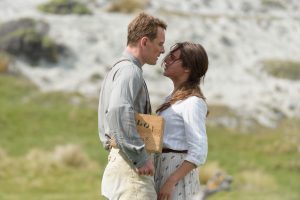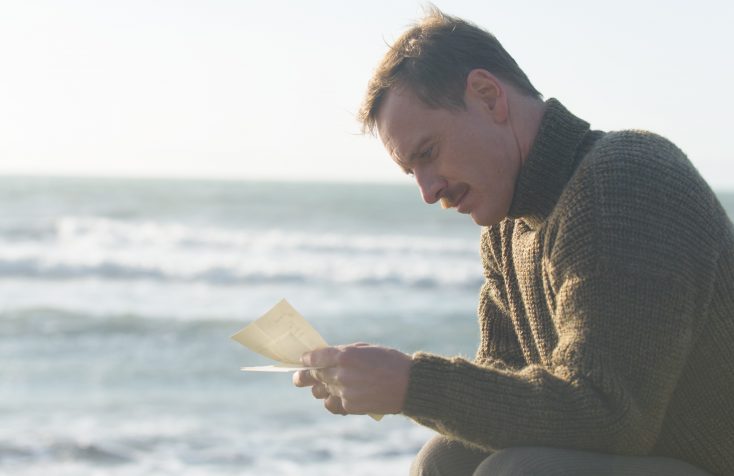
Michael Fassbender stars as Tom Sherbourne and Alicia Vikander as his wife Isabel in DreamWorks Pictures poignant drama THE LIGHT BETWEEN OCEANS ©Dreamworks. CR: Davi Russo.
By ANGELA DAWSON
Front Row Features
NEW YORK—Michael Fassbender stars in the romantic drama “The Light Between Oceans.” Based on the 2012 novel by M.L. Stedman, the story centers on an Australian lighthouse keeper and his wife (Alicia Vikander) who adopt a young castaway but then discover the consequences years later when they find the child’s relatives.
The drama is directed by American filmmaker Derek Cianfrance, who also adapted the novel for the screen.
The 39-year-old German-Irish actor, best known for playing out-of-this-world characters like Magneto in the “X-Men” films or depicting real-life supersize public figures as he did playing computer pioneer Steve Jobs or psychology pioneer Carl Jung, spoke about starring in the post-World War I drama, which was shot on location off the coast of New Zealand. Romantic sparks reportedly flew between he and co-star Vikander, 12 years his junior, while they were filming at the remote location, although the couple is keeping their relationship low-key and private.
Q: This is a fantastically complicated, complex character that you’re playing here. Could you talk a little bit about who Tom Sherbourne is and what you felt were the challenges of this role? What was it like working with Alicia?
Fassbender: I said to Derek (Cianfrance, the director) early on, “This girl frightens me.” She’s so fierce and brave as a performer. It kind of bowled me over. It was great and really made me feel like I had to come to work in the morning. It was great, because we had a great chemistry from the beginning. We really relied on one another and pushed one another and supported one another and that’s really the ideal scenario when you’re working together.
Then we had fun as well. Between takes we would have a laugh, which I always think all of us spend so much time working, might as well have fun while you’re doing it, and that should be important. Then under Derek’s tutelage, we came to work and we really dug around in the weeds every day, trying to find a flower wherever we could. I learned early on that it wasn’t going to be an easy day if it was just necessarily not so many pages to shoot, because we might have a quarter of a page to shoot and Derek is rolling for hours on it. It’s like he kept finding stuff and kept pushing us to find new things and to explore. It was very special. I had to milk a goat, which I did successfully in one take.
Q: Which you don’t see in the movie.
Fassbender: No. There was a comedy element too of me trying to round the goat up, which I got very frustrated, which added to the comedy, of course. It looked a little odd, I suppose, me trying to take a goat from behind. He kept that to blackmail me down the line. It was again an absolute honor to get the opportunity to play Tom Sherbourne. I read the script before I read the book. I was just so moved by the story. I just thought, “Wow. Here’s such a rare, in a way kind of old-fashioned story, human story about ordinary people trying to navigate life, and there wasn’t a clear sort of villain and good guy. It was just like I say, decent, ordinary people that make some decisions that are very damaging and costly and just really touched me emotionally and somewhere primal it really got to me and Tom as a character, I really find him to be a hero. For me he’s a hero. He’s somebody that I would aspire to be like.
Q: Why?
Fassbender: Because he lives by his choices. Like with Isabel, he’s loyal to the end with her and he almost dies through that loyalty. He’s a man of his word. He is somebody that carries his responsibility very seriously, so when we first meet him he decides to go to an island to get away from people. Part of the idea of that for me was that he’d seen so much death and destruction in World War I and he’d been a part of, he’d had his own portion to blame for that, that he decided that he didn’t want to hurt or bring harm to anybody in his life, whatever remained of his life, so therefore decided to go into isolation.
Also, I think he’s a very noble character. I thought even through the absolute hardship they’ve had trying to have children, when they discover the child, he knows in his heart of hearts that the best thing to do is notify the authorities. That is again a very impressive decision to make, considering what they’ve been through as a couple together, and they’re trying to have a family, and here’s the opportunity to do it. He’s just a very straight shooter and what you see is what you get.
Q: Given how there were so many emotionally devastating scenes, as a human being how did you shake off your role, emotionally?
Fassbender: The wind as well on that part of the world, Cape Campbell, which is a northeast point on the southern island in New Zealand. It’s very exposed and the wind just came howling through there so it’s really invigorating and also it made me realize how light keepers go crazy, how the wind can drive people mad. That’s not answering your question. I just thought I’d add that. We were tired, basically. At the end of the day, you’d just crash and we got up pretty early because we were trying to get, a lot of the times, first light, so we had barbecues together, we had movie nights, or night, actually. It turned out to be one night. We had all these great plans of having all these movies. We were on this island and it was hard to get a projector. (Our entertainment was) pretty simple stuff, because we were away from everything. Far removed. The farmer that gave the land to us came around pretty drunk. I think he was happy to have some company.
Q: Regarding the period details, specifically the background of post-World War I, how do you think that will affect audiences today, looking back on history and what we know about the history of World War I leading up to World War II regarding the characters and how they’re getting over and recovering from that trauma?
Fassbender: The first thing is and we were joking about it before, what drew Isabel to Tom, there weren’t many men left in the town of Partageuse, all jokes aside. The town was decimated of their male population of a generation and so that was the reality for these small towns. One thing for me that is really important in this story and perhaps is overshadowed by the tragedy that they experience through the loss of the children that they’re trying to have, is what happens to friends and this idea of a mob chasing this guy who had nothing to do with the war, and how he gets killed and how we’re living in a society today where we’re dealing with exactly this problem, migrants and how people get persecuted and how a mob can get out of hand and attack a group of people or for whatever reasons, through their ethnicity or their religious beliefs or whatever else it is, that’s a frightening thing. It’s a huge part of the story in a way but something that’s perhaps one wouldn’t focus in on. That’s something to do with what happens, the remnants of a war, what comes back home after the war and a very important theme.
Q: Since you are from Europe and there is this tremendous refugee crisis there, did that weigh on you in any way in terms of both the hostility and fear of foreigners and also the obligations you might feel to refugees, sacrificing for them versus benefiting from them?
Fassbender: I think we’re all responsible because we’re seeing what’s occurred since the Iraq war. This is what happens when you go to war, the displacement of hundreds of thousands, millions of people, because we went in and started a war there, so we’re all responsible, absolutely, I feel.
Q: After you make a film like this, does the character stay with you afterwards, once you leave the set and you’re back home?
Fassbender: I guess there’s always a bit of a residue, but I’ve been doing it for a while. I’ve developed a good way of turning off when I get home. It’s the thing of if I’m going to meet friends for dinner that night, they’d be like, “Oh, here he goes again. He keeps obsessing over himself in these characters.” I kind of like to wash it free at the end of the day as much as possible, but you’re always living with them until the job’s done.




